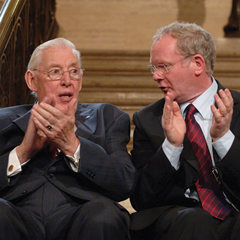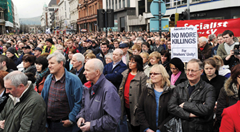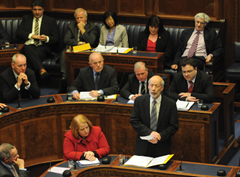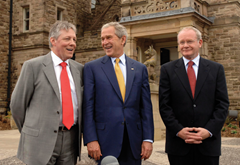Stormont in review 2007-2011
 Northern Ireland politics moved its focus from peace to the economy over the 2007-2011 Assembly. Results were modest but a stable power-sharing government was firmly established.
Northern Ireland politics moved its focus from peace to the economy over the 2007-2011 Assembly. Results were modest but a stable power-sharing government was firmly established.
2007
After a decade of soundbites, stalling and talks, this was it. Northern Ireland, it appeared, had reached the peace process’ final stretch as traditional enemies pledged to work together. The sight of Ian Paisley and Gerry Adams side- by-side took even hardened journalists aback and was a genuinely historic moment. It was, though, the natural conclusion after Sinn Féin’s pledge to support the PSNI that January and the DUP’s decision to share power. Peter Hain was also ready to send out the water charge bills.
Those words are worth recalling four years on.
“We must not allow our justified loathing of the horrors and tragedies of the past to become a barrier to creating a better and more stable future,” said Paisley. For Adams, it was “a time for generosity, a time to be mindful of the common good and of the future of all our people.”
A sense of celebration was clear on
8 May. Paisley declared that “a time when hate will no longer rule” had come, while Martin McGuinness wished him “all the best as we step forward towards the greatest, yet most exciting challenge of our lives.”
Stormont’s first resolution (10 May) was to rejoin the Commonwealth Parliamentary Association, followed by calls for more women in politics, better railways and support for ‘undocumented’ Irish migrants in the USA. There was plenty of spin but Northern Ireland also felt a real sense of optimism in those heady days.
That autumn’s political atmosphere was cooler as the parties marked out their positions: no Irish Language Act from the DUP and an end to the official 11-plus from Sinn Féin. Margaret Ritchie cancelled the Conflict Transformation Initiative funding package for loyalists, after rioting in Bangor.
The murder of South Armagh man Paul Quinn, on 20 October, also rattled the process. His family claimed IRA involvement, which was strongly denied by Sinn Féin. The DUP concluded that it was not ordered by a central command.
In a united front, Paisley and McGuinness presented their Programme for Government, Budget and Investment Strategy on 25 October, which would be passed in January 2008. Alliance revelled in its status as leading the small ‘opposition’ while hardline unionists coalesced around Jim Allister when the TUV was formed in December.
2008
 Amid criticism over his links to developer Seymour Sweeney and allegations he lobbied on his behalf, the DUP’s Ian Paisley Junior resigned from his position as a junior OFMDFM minister on 18 February. He was replaced by Jeffrey Donaldson. Paisley Junior was later cleared of breaking Assembly rules by the Assembly Ombudsman and said that he was “not going because of some hidden or some revealed wrongdoing.”
Amid criticism over his links to developer Seymour Sweeney and allegations he lobbied on his behalf, the DUP’s Ian Paisley Junior resigned from his position as a junior OFMDFM minister on 18 February. He was replaced by Jeffrey Donaldson. Paisley Junior was later cleared of breaking Assembly rules by the Assembly Ombudsman and said that he was “not going because of some hidden or some revealed wrongdoing.”
The appointment of four victims’ commissioners, each with a salary of £65,000, was a sign of “political deadlock at the heart of the Executive”, according to Danny Kennedy. OFMDFM had planned to appoint one commissioner. Journalists were not permitted to ask questions at the press conference for the announcement.
The DUP was shocked when the UUP won the Dromore by-election on 14 February, with the help of transfers. This was the TUV’s first appearance on the political scene and the result was taken as a sign of the unionist grassroots anger at the DUP’s decision to share power with Sinn Féin. On 4 March Ian Paisley announced that he would step down and he was replaced by Peter Robinson on 5 June. Robinson was determined to end the ‘chuckle brothers’ image and promised “a more collective and corporate decision-making process.”
George W Bush paid a brief visit in June and received a courteous reception. Ministers have since met and invited Barack Obama, which shows the status Northern Ireland continues to receive in America.
Wrangling between Sinn Féin and the DUP, over missing the suggested May date for devolving policing and justice, led to Sinn Féin boycotting the Executive for five months. The party was subsequently criticised for blocking business in the Assembly at a time when other administrations were devising economic strategies to survive the growing recession. In November, the two parties agreed to appoint a Justice Minister by a cross-community vote. The Executive got back to work and sat longer in a bid to compensate for the five-month break.
David McNarry also moved the Assembly’s first private member’s Bill, on extending carer’s allowance to pensioners.
The Independent Monitoring Commission’s report in November ominously stated that the Real IRA and the Continuity IRA had been more active in the last few months because they sensed there was a political vacuum and disaffection among republicans.
2009
That threat was brought home by the murders of Sappers Patrick Azimkar and Mark Quinsey outside Massereene Barracks on 7 March, for which the Real IRA claimed responsibility. Constable Stephen Carroll was shot dead by the Continuity IRA two days later.
For the first time, the killings united all the main parties in condemnation. In Peter Robinson’s words, it was “the kind of unity that can defeat anybody” while Martin McGuinness described the killers as “traitors to the island of Ireland”.
 The Review of Public Administration bore fruit with the establishment of the Health and Social Care Board, merged from four predecessors, on 1 April 2009. Michael McGimpsey’s reform differed from direct rule plans, as it involved setting up a large Public Health Agency. However, the proposed Education and Skills Authority was held up in the continued dispute over academic selection. Local government reform, to cut 26 councils down to 11, would fall through in June 2010.
The Review of Public Administration bore fruit with the establishment of the Health and Social Care Board, merged from four predecessors, on 1 April 2009. Michael McGimpsey’s reform differed from direct rule plans, as it involved setting up a large Public Health Agency. However, the proposed Education and Skills Authority was held up in the continued dispute over academic selection. Local government reform, to cut 26 councils down to 11, would fall through in June 2010.
were two dark marks on the year. Serious flooding also affected the province in August and November.
European elections in June would be the first province-wide election since devolution returned. Each Executive party set out its stall of achievements in Europe and at home. However, the expenses scandal in Westminster increased cynicism in politics at a time when many people were losing their jobs or facing pay cuts.
While unsuccessful, Jim Allister polled 66,197 first preferences and claimed there were a lot of Assembly P45s in that. Sinn Féin topped the poll for the first time, although the party avoided triumphalism, while the DUP’s Diane Dodds came in on the third count. It was a depressing day for her party, which promised to do more listening. A reshuffle followed and double-jobbing DUP MLAs started to move to the backbenches.
Despite the political rifts, 2009 saw the Executive settle down over its first full non-stop year. Northern Ireland also welcomed back the Tall Ships and joined in celebrations when Ireland’s rugby team won the Grand Slam.
Nationalists and the two governments were still frustrated by the delay on transferring justice powers but, politically, the year ended on a stable note.
2010
That calm was soon disturbed. The first political story of 2010 could not have been predicted. Iris Robinson’s resignation amid scandal rocked the process and led to her husband stepping down briefly as First Minister. Arlene Foster filled the vacancy.
Meanwhile, political moves to devolve justice gathered pace. Another Catholic constable, Peadar Heffron, was seriously injured in a car bombing outside Randalstown in early January. Secretary of State Shaun Woodward claimed that the transfer would help to deter terrorism and attract investment. As politicians negotiated the details inside Hillsborough Castle, public frustration mounted outside as several large job losses were announced.
A deal was reached on 5 February, Robinson returned as First Minister and the Assembly voted for devolution on 9 March. The UUP, though, objected despite intense external pressure and claimed that a failing Executive should not be given more power.
David Ford was duly elected as Justice Minister, on 12 April. Alliance went into government on condition of progress on cohesion, sharing and integration. The resulting document, though, was light on detail.
Alliance’s decision left only five out of 108 MLAs in opposition, which raised questions about the Executive’s accountability. That said, the Executive was more often divided than united, with the UUP and SDLP claiming they were being sidelined.
Margaret Ritchie was elected as SDLP leader on 7 February and handed over her ministry to Alex Attwood. Attention then turned to the general elections, where the UUP and TUV were keen to take ground from the DUP. Both were unsuccessful but, in a setback for the DUP, Peter Robinson lost in East Belfast. Sinn Féin again topped the poll.
Eight of the new MPs gave up their Assembly seats, which were then filled by party nominees. Relations with the Coalition Government were considerably cooler than with Labour. David Cameron, though, was applauded for apologising for Bloody Sunday, following the Saville report’s publication.
The UUP chose Tom Elliott as party leader in September. Danny Kennedy succeeded Reg Empey as Employment and Learning Minister. The long-anticipated Spending Review in October united most parties against the cuts, although the UUP saw these as necessary after Labour’s excessive spending.
Stormont and Westminster contested the size of the cuts: 8.0 per cent of resource spending according to the DFP and 6.9 per cent according to the NIO. Both accepted that capital spending took the largest ‘hit’ (37 per cent or 40.1 per cent depending on the calculation).
A draft Budget included an inflation-linked rates rise, a two-year pay freeze for civil servants earning over £21,000 and ringfenced budgets for the Health Service and PSNI. Health became the most contentious area with Michael McGimpsey asking for further increases and the DUP claiming the system was inefficient.
Water charges were ruled out. However, water proved to be the Executive’s Achilles heel that winter. The causes were natural, a deep freeze followed by a rapid thaw leaving 60,000 homes with little or no water, but Northern Ireland Water responded slowly and failed to keep the public informed. Chief Executive Laurence MacKenzie resigned but Conor Murphy rejected criticism, pointing out that the company was at arm’s length from government.
Gerry Adams announced in November that he would contest the Irish general election in Louth. To him, it was a natural step as “leader of the only all-Ireland party with an all-island mandate” but his profile had also fallen in comparison to Martin McGuinness.
Drawing up the Budget was a particularly difficult task as an election approached. Politicians, Sammy Wilson said, “love to throw all the goodies out to people” but defending hard decisions “requires a whole different set of political skills”. The divide within the Executive widened with the UUP and SDLP increasingly vocal in opposing the budget. Wilson contended that Stormont had no other choice and the Budget was carried 67-31.
In the rush to complete the term, John McCallister’s Caravans Bill received royal assent, the first to become law since the Wild Birds (Protection) Act 1931. Another backbench innovation, Pat Ramsey’s attempt to making cycling helmets compulsory, passed its second stage but fell at dissolution. The Assembly asserted itself in rare free votes throughout its term e.g. banning hare coursing but avoiding an outright ban on hunts.
A backlog of legislation took up most debating time at the end, including the Planning Bill, which transferred some powers to councils, in anticipation of the new councils.
Speaker William Hay paid a comprehensive tribute to members and Assembly staff on the final day (23 March). “I commend all members for their work and wish them well for the future,” he stated, “I believe that Northern Ireland’s best years are ahead of us.”
In the final reckoning, Stormont had stayed the course although its successes fell far short of its ambitions. The economic situation, which seemed so bright in spring 2007, turned against the Executive from 2008 onwards with consequences beyond its control. Reform proved partly successful in health but was stalled in local government. Rates were frozen and water charges held back. Education policy was an overall failure.
At times, Stormont has seemed self- absorbed by battles over technicalities when voters were more worried about finding or holding on to a job.
Yet, when the Northern Ireland’s troubled past is considered, its best years are indeed ahead. The Assembly faces change in its workings and cuts to public services over the next four years, which will require considerable political maturity.
Devolution has obvious limits. It cannot deliver everything but it can deliver more now than before. All parts of everyday life are now influenced by local MLAs and ministers, for good or bad, who can in turn be held accountable.
Stormont’s system is imperfect and complex, the legacy of the divided society it rules. That aside, Northern Ireland now has some measure of government of the people, by the people and for the people.
2007
7 March
Assembly elections
26 March
DUP-Sinn Fein power-sharing deal
8 May
Devolution returns
4 Dec
Caitriona Ruane announces end to 11+
2008
28 Jan
Programme for Government and Budget passed
18 Feb
Ian Paisley Junior resigns as Junior Minister
5 June
Peter Robinson appointed First Minister
June-Nov
Sinn Fein boycotts Executive
2009
7&9 March
Dissidents murder two soldiers and a police officer
4 June
DUP slips in European elections Sinn Fein becomes largest party
2010
8 Jan
Iris Robinson scandal breaks
5Feb
Hillsborough Castle Agreement
12 Apr
Devolution of policing and justice David Ford becomes Justice Minister
Dec
Severe freeze and thaw
Northern Ireland Water criticized over water shortages
2011
9 March
2011-2015 Budget passed
24 March
Assembly dissolves






